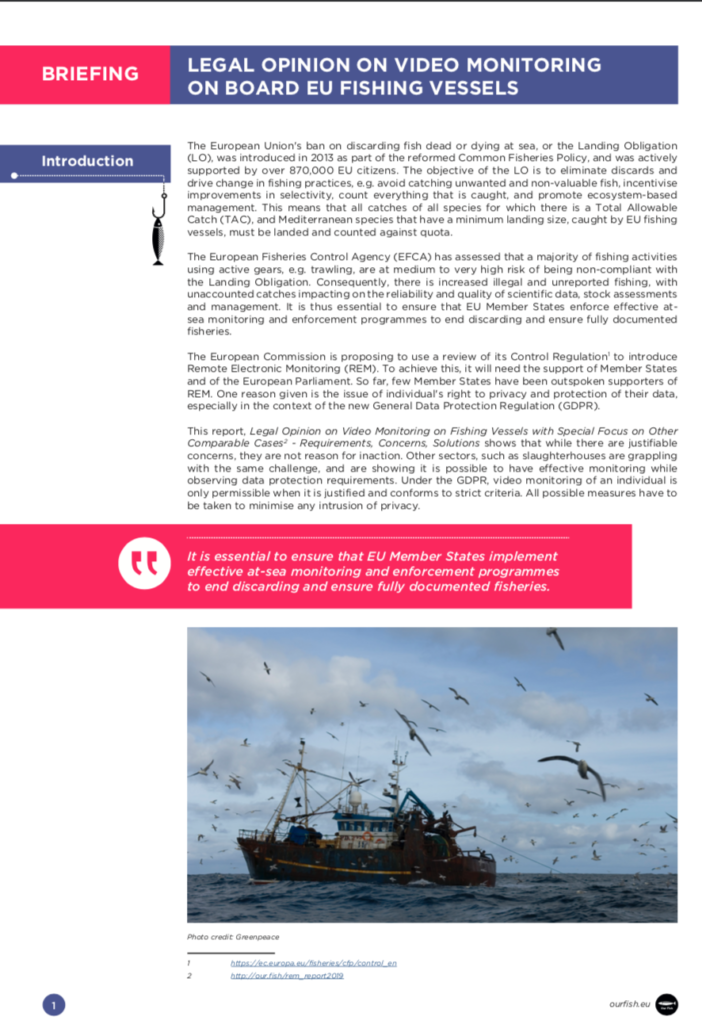 The European Union’s ban on discarding fish dead or dying at sea, or the Landing Obligation (LO), was introduced in 2013 as part of the reformed Common Fisheries Policy, and was actively supported by over 870,000 EU citizens. The objective of the LO is to eliminate discards and drive change in fishing practices, e.g. avoid catching unwanted and non-valuable fish, incentivise improvements in selectivity, count everything that is caught, and promote ecosystem-based management. This means that all catches of all species for which there is a Total Allowable Catch (TAC), and Mediterranean species that have a minimum landing size, caught by EU fishing vessels, must be landed and counted against quota.
The European Union’s ban on discarding fish dead or dying at sea, or the Landing Obligation (LO), was introduced in 2013 as part of the reformed Common Fisheries Policy, and was actively supported by over 870,000 EU citizens. The objective of the LO is to eliminate discards and drive change in fishing practices, e.g. avoid catching unwanted and non-valuable fish, incentivise improvements in selectivity, count everything that is caught, and promote ecosystem-based management. This means that all catches of all species for which there is a Total Allowable Catch (TAC), and Mediterranean species that have a minimum landing size, caught by EU fishing vessels, must be landed and counted against quota.
The European Fisheries Control Agency (EFCA) has assessed that a majority of fishing activities using active gears, e.g. trawling, are at medium to very high risk of being non-compliant with the Landing Obligation. Consequently, there is increased illegal and unreported fishing, with unaccounted catches impacting on the reliability and quality of scientific data, stock assessments and management. It is thus essential to ensure that EU Member States implement effective at-sea monitoring and enforcement programmes to end discarding and ensure fully documented fisheries.
The European Commission is proposing to use a review of its Control Regulation to introduce Remote Electronic Monitoring (REM). To achieve this, it will need the support of Member States and of the European Parliament. So far, few Member States have been outspoken supporters of REM. One reason given is the issue of individual’s right to privacy and protection of their data, especially in the context of the new General Data Protection Regulation (GDPR).
This report, Legal Opinion on Video Monitoring on Fishing Vessels with Special Focus on Other Comparable Cases – Requirements, Concerns, Solutions shows that while there are justifiable concerns, they are not reason for inaction. Other sectors, such as slaughterhouses are grappling with the same challenge, and are showing it is possible to have effective monitoring while observing data protection requirements. Under the GDPR, video monitoring of an individual is only permissible when it is justified and conforms to strict criteria. All possible measures have to be taken to minimise any intrusion of privacy.
Briefing: Briefing: Legal Opinion on Video Monitoring on board EU Fishing Vessels (3 pages, pdf)
Report Legal Opinion on Video Monitoring on Fishing Vessels with Special Focus on Other Comparable Cases – Requirements, Concerns, Solutions (10 pages, pdf)
